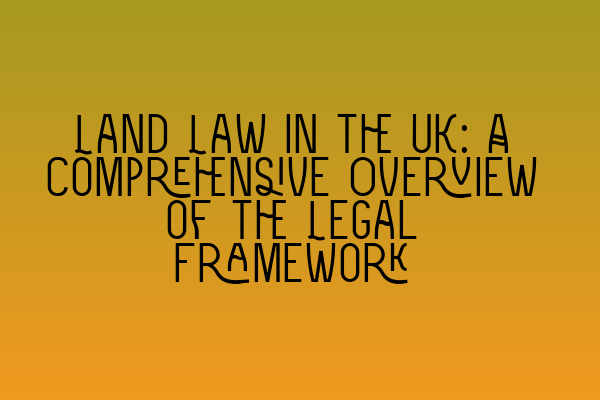Land Law in the UK: A Comprehensive Overview of the Legal Framework
Welcome to SQE Property Law & Land Law, your trusted solicitors specializing in all matters related to land law in the UK. In this blog post, we will provide you with a comprehensive overview of the legal framework surrounding land law in the United Kingdom.
Land law governs the rights and obligations arising from the ownership, use, and transfer of land. It encompasses a wide range of legal principles and rules that determine how land can be owned, occupied, and enjoyed by individuals, businesses, and other legal entities.
The Legal Concept of Land
In the UK, land is defined broadly and includes not only the surface of the earth but also everything below and above it. This includes buildings, structures, fixtures, plants, and trees. The legal concept of land also extends to include certain rights and interests associated with the land, such as easements and restrictive covenants.
Under the UK legal framework, land ownership can take various forms, including freehold and leasehold. Freehold ownership grants the owner absolute ownership of both the land and any structures or buildings on it. Leasehold ownership, on the other hand, involves long-term leasing of the land from the freehold owner, typically for a specified period of time.
The Transfer of Land
The transfer of land in the UK is primarily governed by the Law of Property Act 1925, which sets out the requirements and formalities for transferring a legal estate in land. One of the key requirements for a valid transfer is the need for a written document, usually in the form of a contract or deed, signed by the parties involved.
Additionally, certain legal formalities, such as the presence of witnesses or registration with the Land Registry, may be necessary depending on the type of land transfer. It is essential to seek professional legal advice to ensure compliance with these requirements and avoid any potential disputes or complications.
Land Registration
The Land Registry plays a vital role in maintaining an accurate record of land ownership in the UK. It is responsible for recording and registering legal interests in land, which provides certainty and protection for both landowners and third parties. Registering land with the Land Registry helps establish legal ownership and creates an official record of any rights or restrictions affecting the land.
It is important to note that not all land needs to be registered with the Land Registry. Some older land titles may still be unregistered, especially in rural areas. However, the government has been actively encouraging landowners to voluntarily register their land to ensure a comprehensive and up-to-date record of land ownership.
Land Law Disputes
Disputes relating to land are not uncommon and can arise for various reasons, such as boundary disputes, adverse possession claims, or breaches of restrictive covenants. Resolving land law disputes often involves complex legal issues and requires a thorough understanding of the relevant legislation and case law.
At SQE Property Law & Land Law, our team of experienced solicitors are well-versed in handling land law disputes. We have a proven track record of successfully representing our clients in court and achieving favorable outcomes. If you find yourself involved in a land law dispute, we are here to provide you with expert legal advice and assistance.
Contact SQE Property Law & Land Law Today
If you require professional legal assistance with any land law matters, do not hesitate to contact SQE Property Law & Land Law. Our team of specialist solicitors are ready to guide you through the complex legal framework and provide you with the support you need.
For additional resources on legal exams such as SQE 1 Practice Exam Questions and SQE 2 Preparation Courses, please visit the following links:
- SQE 1 Practice Exam Questions
- SQE 1 Practice Mocks FLK1 FLK2
- SQE 2 Preparation Courses
- SQE 1 Preparation Courses
- SRA SQE Exam Dates
Disclaimer: This blog post is for informational purposes only and does not constitute legal advice. Always consult with a qualified solicitor for personalized advice on your specific circumstances.
